The Most Easy Animal to Take About Elephant
When it comes to the smartest species within the animal kingdom, elephants are definitely near the top of the list. How smart are elephants, then? Well, for starters, they have larger brains than every other land mammal! Elephants are capable of expressing a huge range of complex emotions, and they've even been known to use tools in surprisingly elaborate ways.
But these complex behaviors and survival mechanisms are only the beginning of elephant intelligence! Let's take an in-depth look at just how bright elephants are. We'll look at the many ways they exhibit their intelligence both in the wild and in captivity.
How Do We Measure Elephant Intelligence?
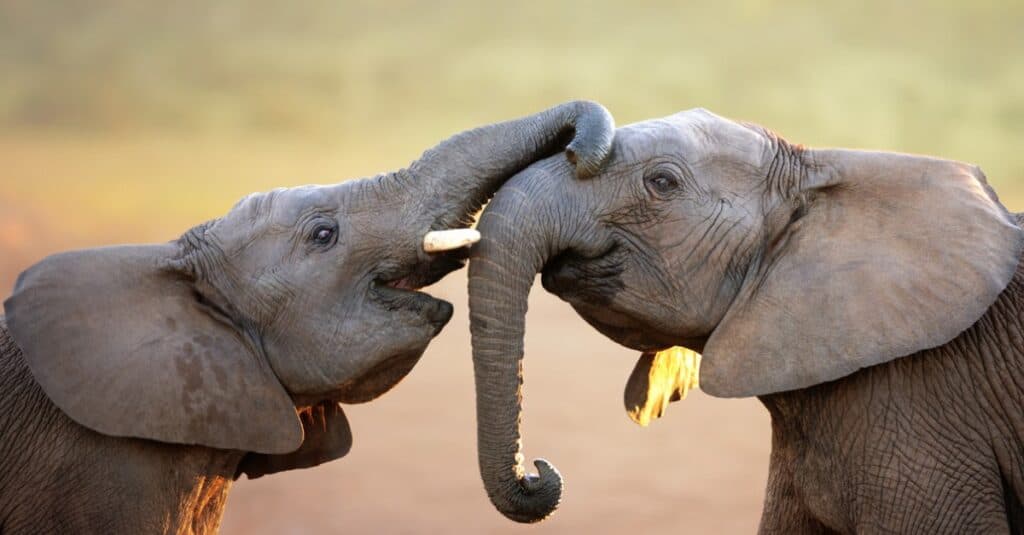
iStock.com/johan63
Animal intelligence is a fascinating yet highly nuanced topic. Historically, it's been quite difficult to measure. After all, we can't just give animals IQ tests or ask them to solve math equations. Fortunately, scientists have devised an array of strategies when it comes to estimating and comparing the intelligences of certain animals. As you might imagine, elephants have mastered all of them!
The main factors researchers analyze when measuring an animal's mental capacity are self-awareness, emotional range, use of tools, play behaviors, short- and long-term memory, social structures, and social behaviors, among many others.
Of course, the short answer to "are elephants smart" is a resounding "yes!" However, definitively and precisely measuring an elephant's intelligence is a bit more difficult. Let's take a look at some of the factors used to gauge animal intelligence and how elephants measure up.
Elephants and The Mirror Test
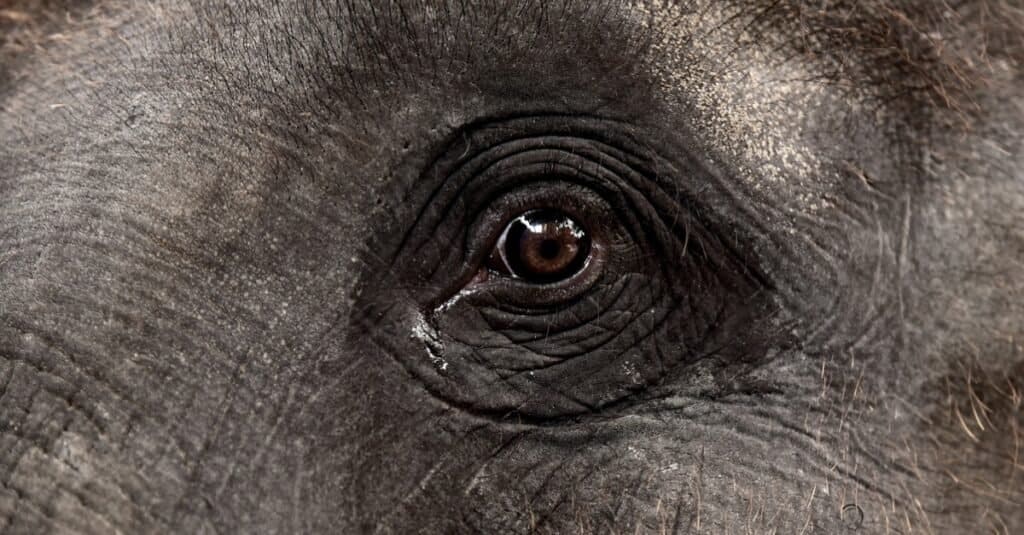
iStock.com/Kreangagirl
Perhaps the most well-known method of gauging animal intelligence is the "mirror test." It's essentially a measurement of an animal's self-awareness by determining whether they are able to recognize themselves in a mirror.
Most animal species are not self-aware. When a species lacking self-awareness sees itself in a mirror, like your cat or a lizard, they perceive their reflection as another animal rather than an image of themselves. They may try to fight with their reflection or display fear or confusion when exposed to a mirror. But if an animal is able to show they understand that their reflection is, in fact, a representation of themselves, they "pass" the mirror test.
Even human children are unable to pass the mirror test until they reach around 1.5 to 2 years of age! Only a handful of species have shown success when exposed to the test; humans and great apes are the main species that consistently pass it every time.
However, other animals such as dolphins, crows – and, yes, elephants – have shown promise when exposed to the mirror test, too! Although we still need more definitive research on the topic, studies have shown that Asian elephants are capable of recognizing themselves in a mirror.
Elephants' Emotional Intelligence and Social Structure
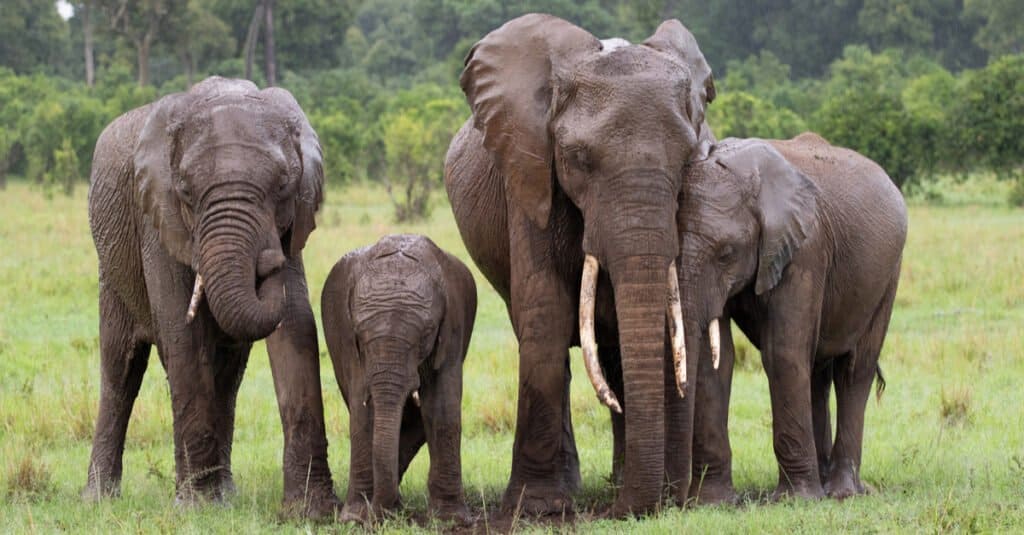
Neil Tyers/Shutterstock.com
So, what other methods do we use to determine elephants' intelligence?
Aside from measuring self-awareness with the mirror test, scientists also closely observe elephants' social behaviors. They look at things like social structures and hierarchies within groups of elephants to determine if the animals are capable of complex emotions, communication, and cooperation with one another.
When it comes to social intelligence, elephants are also amazingly sophisticated! They have been shown to care deeply for and protect one another within their family groups. They will even grieve when a close companion or family member dies. Their emotional range is impressive, and elephants commonly work together to access and share resources like food and water or to protect each other from predators.
In addition, elephants are expert communicators. They use all their senses – hearing, sight, smell, taste, and touch – when interacting and collaborating with each other.
Elephants have a vast range of signals, calls, gestures, and cries, which they use for purposes like alerting their herd to predators, solving conflicts, attracting and courting mates, and even just casually chatting with other herd members.
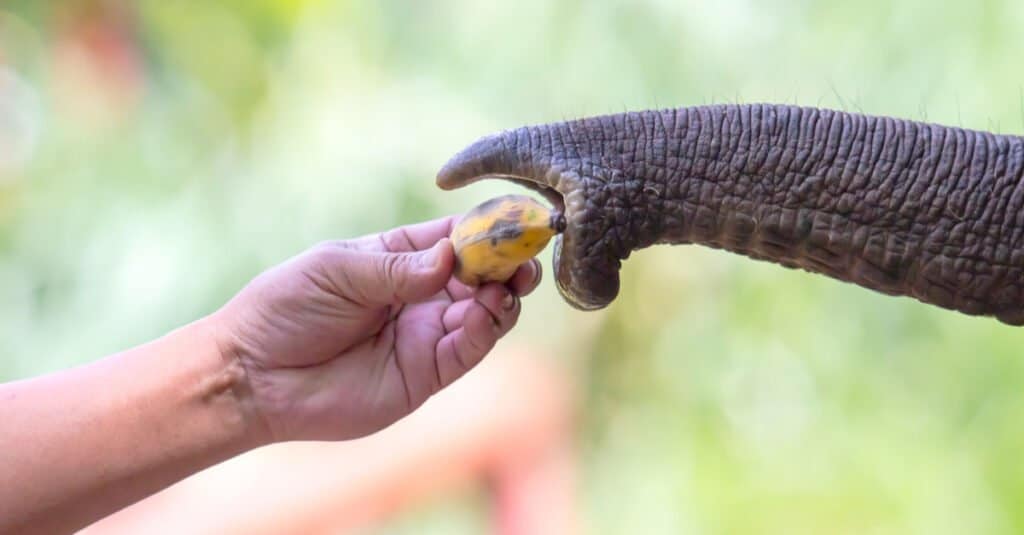
tiverylucky/Shutterstock.com
Another key way ethologists, or animal behaviorists, measure elephants' intelligence is by examining their use of tools. A wide range of animals such as birds, mammals, and even insects are capable of using tools. However, only a handful of species use them regularly and consistently in remarkably intricate and complicated ways.
It turns out that elephants are masters of using tools like rocks and tree branches for very sophisticated purposes! Researchers have observed elephants using branches as back scratchers, to swat at flies, or even as weapons to smack people or other animals who get too close. They'll also carry around the branches for long periods of time to use them again later.
Notably, elephants' strong, flexible trunks are a huge help to them when it comes to tool use. They'll commonly pick up rocks and branches with their trunks and use them to plug water holes they previously dug to ensure the water doesn't dry up. Alternatively, they'll use their trunks to wield large branches to knock fruits and leaves out of trees so they and their herd members can eat them.
When it comes to elephants and tool use, the possibilities for them are endless! The use of tools (like in the examples mentioned above) is a key determinant of animal intelligence, as it takes a highly intelligent animal to figure out and remember how to use them.
Do Elephants Really "Never Forget?"
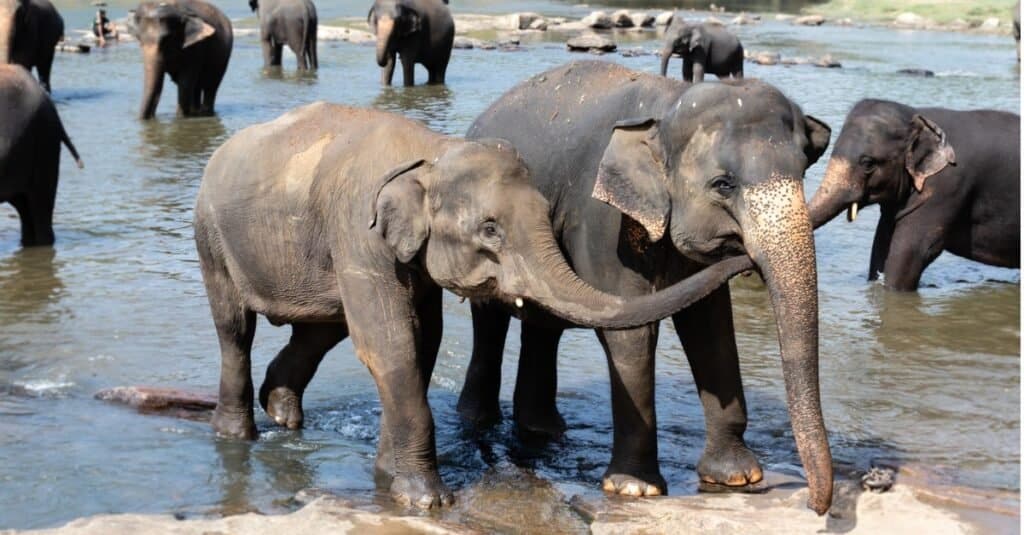
iStock.com/Nilanka Sampath
We've all heard the saying "an elephant never forgets" at some point. As it turns out, the old saying is based in far more truth than you'd think! After all, an elephant's brain weighs almost 5 kilograms and has three times more neurons than a typical human brain.
Elephants are capable of remembering food and water locations for amazingly long periods of time! Herds in the wild will often return to watering holes several weeks after they initially discovered them.
But they don't just use their impressive memories for finding resources. Elephants also remember friends and even enemies for several years. They can memorize the approximate locations of as many as 30 companions at once and will seek them out to catch up and communicate with them from time to time.
So, if anyone ever asks you how smart elephants are, you can tell them with confidence that elephants are really, really smart–not only in terms of basic cognition but also when it comes to their memory and social/emotional intelligence!
Source: https://a-z-animals.com/blog/how-smart-are-elephants/